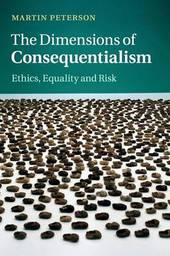
|
The Dimensions of Consequentialism: Ethics, Equality and Risk
Paperback / softback
Main Details
| Title |
The Dimensions of Consequentialism: Ethics, Equality and Risk
|
| Authors and Contributors |
By (author) Martin Peterson
|
| Physical Properties |
| Format:Paperback / softback | | Pages:228 | | Dimensions(mm): Height 230,Width 152 |
|
| Category/Genre | Ethics and moral philosophy
Economic theory and philosophy |
|---|
| ISBN/Barcode |
9781107540606
|
| Classifications | Dewey:171.5 |
|---|
| Audience | | Professional & Vocational | |
|---|
| Illustrations |
13 Tables, black and white; 2 Halftones, unspecified
|
|
Publishing Details |
| Publisher |
Cambridge University Press
|
| Imprint |
Cambridge University Press
|
| Publication Date |
6 August 2015 |
| Publication Country |
United Kingdom
|
Description
Consequentialism, one of the major theories of normative ethics, maintains that the moral rightness of an act is determined solely by the act's consequences. The traditional form of consequentialism is one-dimensional, in that the rightness of an act is a function of a single moral aspect, such as the sum total of wellbeing it produces. In this book Martin Peterson introduces a new type of consequentialist theory: multidimensional consequentialism. According to this theory, an act's moral rightness depends on several separate dimensions, including individual wellbeing, equality and risk. Peterson's novel approach shows that moral views about equality and risk that were previously thought to be mutually incompatible can be rendered compatible, and his precise theoretical discussion helps the reader to understand better the distinction between consequentialist and non-consequentialist theories. His book will interest a wide range of readers in ethics.
Author Biography
Martin Peterson is Associate Professor of Philosophy at Eindhoven University of Technology, The Netherlands. He is author of Non-Bayesian Decision Theory (2008) and An Introduction to Decision Theory (Cambridge, 2009).
Reviews'... full of mathematical proofs and engages with related literature and selected intuitions ...' S. E. Forschler, Choice
|